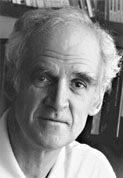Philosopher's gold
Emeritus professor of philosophy Charles Taylor was awarded the inaugural Social Sciences and Humanities Research Council of Canada (SSHRC) Gold Medal for Achievement in Research. The award is the council's highest honour, and is worth $100,000.

Charles Taylor
Taylor -- no stranger to such accolades, having already been the recipient of a Molson Prize, Order of Canada, Ordre national du Quebec and Prix Léon-Guérin -- was nonetheless pleased to have received the SSHRC award. He beat out such luminaries as Linda Hutcheon, Will Kymlicka, Jean-Jacques Nattiez and Donald Savoie.
"The SSHRC represents the research community in Canada because although it's a government body, all of its awards are peer reviewed. It's an accolade from the whole research community. I'm very pleased and honoured -- it could have easily gone to any of the other finalists," said Taylor.
Taylor was cited for a body of work that has spanned topics such as individual rights and collective responsibilities, artificial intelligence, language and multiculturalism. His writing has been translated into 20 languages.
Despite his own accomplishments, much of the social sciences are ill understood by most of the public. Taylor believes the new SSHRC award may help to change that.
"A lot of people think [social sciences and humanities research] is a waste of time or a waste of money -- and of course it often is. You can't get research that pays off unless you do a lot of research on speculative ideas that don't turn out," he said.
Taylor is not known for ignoring the big issues. His current research project is on the meaning of the secular state -- a question that has received much attention in the debates on same-sex marriage, George W. Bush's faith-based initiatives and the ongoing war on terror.
Taylor's book is an examination of what is meant by the term secular society, and how it came about.
"People are very mixed up about what they mean by secular society: is it a society in which people don't believe in God anymore, or a separation of church and state like in the U.S., or is it something more subtle and different that separates Western modernity from other parts of the world," he said.
"We don't adequately understand our own development in what we call modernity in the West, and we fail to see that this development is not occurring in the rest of the world, and we can't really understand the difference until we understand better what's happened in our civilization."
